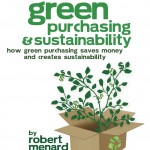The Food and Fuel Dilemma

Robert Menard, Certified Purchasing Professional, Certified Professional Purchasing Consultant, Certified Green Purchasing Professional
In its February 6, 2012 edition, Fortune Magazine entitled The Food-Fuel Dilemma written by Scott Cendrowski, the author contends that the demand for corn ethanol is raising food prices. He claims that a policy change is needed, echoing a claim made in my 2010 book Green Purchasing and Sustainability. In objective fashion, the story cites the Congressional elimination of the $6 billion annual subsidy for corn ethanol given largely to agribusiness and refiners in December 2011.
It is a fact that the world’s growing demand for food is driving up prices for edible crops. Diverting portions of food stocks for fuels has questionable morality at best. Nevertheless, loss of the subsidy will not stop this diversion because US law mandates oil refiners to include corn ethanol at the rate of 12.5 billion gallons in 2012 and at least 15 billion gallons by 2015, more than 10% of all the gasoline produced in the US each year.
The effect of these government mandates has forced the US to surpass Brazil as the world’s leading ethanol producer. In Brazil however, ethanol is produced from sugar cane and residual cane waste (bagasse). I commend you to this blog post which compares the sustainability, societal and financial costs of ethanol from corn and sugar cane.
The story also cites Jeremy Grantham, an investment firm manager who characterizes the US mandates as “diabolical”. He refers to a study from Princeton University that casts doubt, as in my book two years earlier, that ethanol does little to reduce green house gasses and may be more carbon intensive than gasoline. Further, my research of other studies shows that production of ethanol per Btu derived exceeds that of gasoline. Some studies now show that use of ethanol does harm to gasoline burning engines.
Grantham suggests in the story that diverting corn for energy raises the global price of corn by 20%. Not surprisingly, the ethanol lobby has a different view.
The story closes on an optimistic note. The next generation of ethanol uses nonfood stocks such as switch gas and wood chips. Sustainability, in its ultimate accounting, must favor the human race. It follows that co-opting any portion of the food chain to energy production based upon artificial interference in the market place created by self interested parties is unethical, immoral and down right stupid. Non food solutions to increasing energy supplies in an energy and food hungry world is the only sensible solution
Ethanol, an idea whose time has come – and gone.
